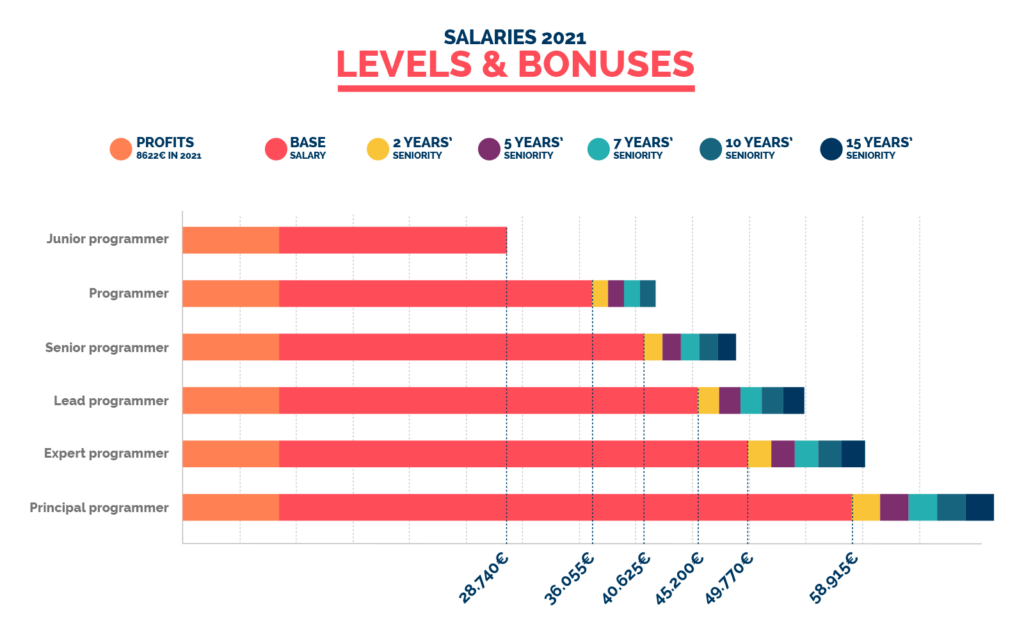Salary disclosure: creating a public scale
Published on July 21, 2021
Discussions related to incomes can create lots of tensions: discriminations, jealousy or even taboos. Do you know your coworkers’ salaries? Or your friends’ and family? Who has never heard this sentence: "We gave you a raise, but don't tell anyone" or the famous "Oh no, we don't talk about money in this house...".
This opacity on salaries and bonuses gains without predefined public scales favors inequalities. In our company, it has never been a taboo and for a good reason: salaries and profits are decided publicly at our monthly general meetings. Everything is discussed together in order to find a fair adjustment.

As you can imagine and despite this total transparency, this system is not without its flaws:
- an employee who knows better how to negotiate will easily get a better increase, or a better starting salary than a more shy person.
- even if we stay relatively attentive to this, it still can lead to inequalities.
Thus, and despite our efforts to maintain fair remunerations, not everyone has the same salary (even with equivalent skills and experience). Once this observation is established, what can we do? Change the salary allocation system!
Our scale took us more than a year of work. 14 general meetings, 30 hours of debates, 4 drafts, 16 votes and many "Where’s our money, Olivier!" is the price to free ourselves from the French system of salary increase (classic individual annual negotiation). We established a pay scale based on 6 competence levels inspired by Basecamp (see also our blogpost written in French about their recent controversy) and Bernard Friot’s papers. This remuneration is supplemented by the profits each employee gets (80% of the profits are divided equally among us, the remaining 20% are invested in the company) and by a bonus for seniority in the company.
The grid is associated with a description of the prerequisites required for each level (technical and management skills, and the number of years of experience), so everyone can position themself at the level that best suits them. On the anniversary date of their contract, each cooperator can submit their repositioning in the grid to a vote. If it’s accepted by the cooperators, the salary increase is noted as well as the evolution of responsibilities that go with it. For the moment, only the technical professions’ grid has been finalized, but the others should be released in the coming months.
You may wonder why such long discussions? Imagine 50 people debating and defining fair salaries that take into account the experience of each person, the attractiveness of salaries in relation to the market, the standard of living imposed by some cities, an efficient distribution between salaries and bonuses, ratio between the lowest and highest salary... Complicated, isn't it? Add to this that each cooperator is double-hatted and must think about their own condition, but also, as a cooperator, about the viability of this change for the company. The first discussions led to a 13% increase of the total wage bill, but faced with the economic impacts and the risks for the sustainability of the structure (especially in these uncertain times) we have changed this objective downwards. This is how we arrived at a long, passionate — tiring but healthy — and transparent debate to make our remuneration more equitable.

- The rate of profit-sharing is voted by the cooperators for all the employees. Today, this profit-sharing rewards us up to 80% of the profits and is practically exempt from taxes (employee and employer), and they can be unlocked under exceptional conditions (like a wedding, birth of a third child…).
- Cooperators living in the Paris region have their salaries increased by 20% to compensate for the difference in the cost of living between this city and other regions of France.
- The title of "Junior Programmer" is designed as a transitional position: it concerns people with little experience (self-taught, retraining, etc.) so that they can increase their skills and move up to the "Programmer" level as quickly as possible. People with long studies are generally directly positioned at least at the "Developer" level.
- In addition to direct income, our cooperative offers many benefits in kind to its employees: lunch and gift vouchers, top-of-the-range health insurance, vacation bonus, daycare seats, sustainable mobility helps, reimbursement of sports licenses, budget of €1,000 per person per year to attend conferences...
- The salaries are re-evaluated each year to take into account the evolution of the market and external factors such as inflation.
This grid has been used since last January and the positioning of the cooperators has already given interesting debates. We will have the opportunity to make it evolve if necessary. This is the charm of the freedom offered by the self-managed workers’ cooperatives: we can experiment, discuss, and iterate in order to find the model that suits us the best.
If this kind of adventure tempts you, several positions are currently opened. Contact us!


